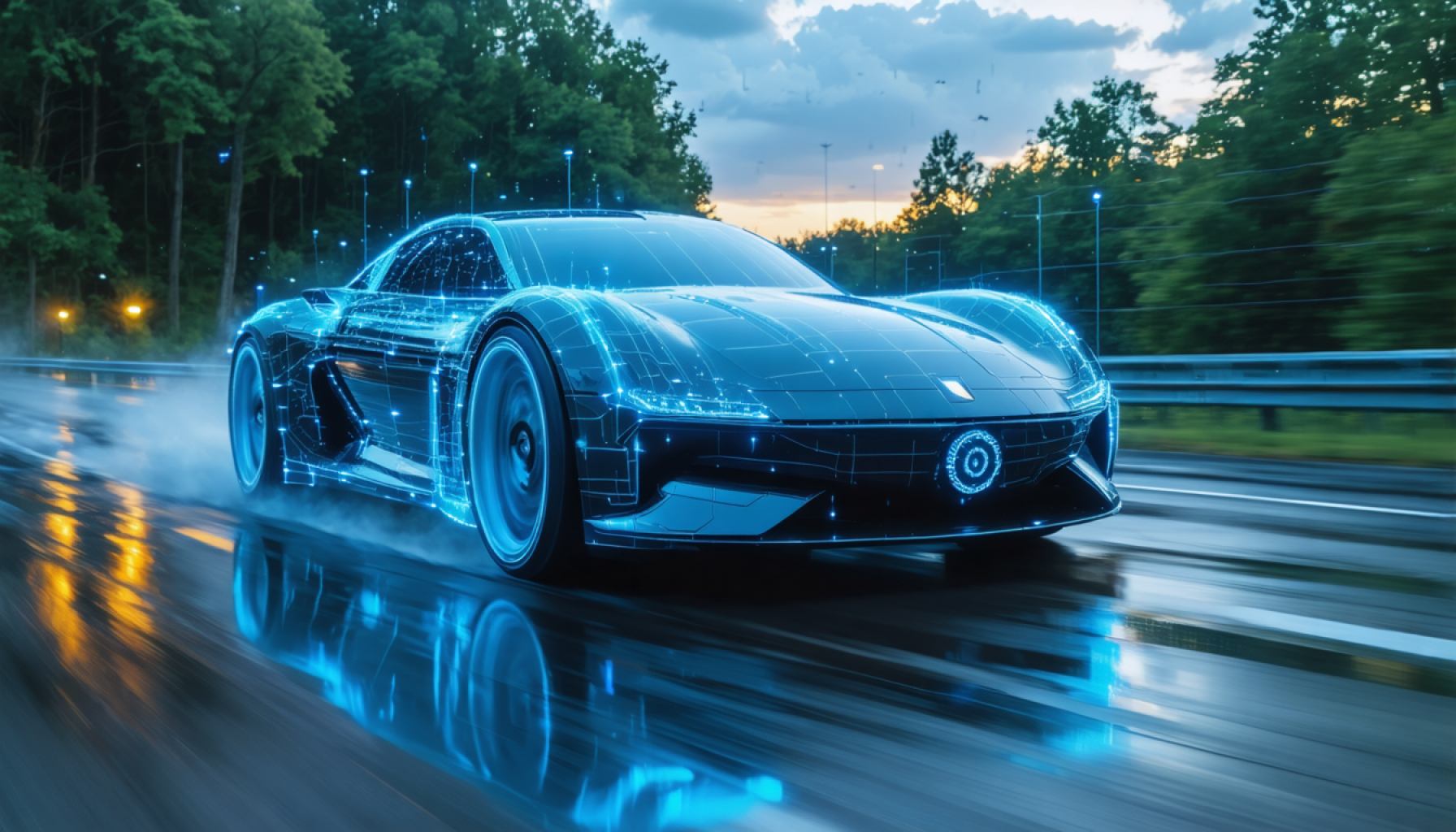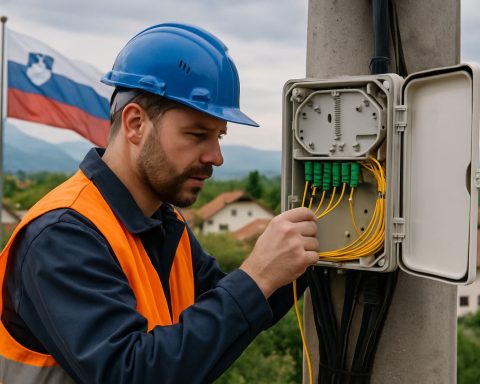- Blockchain technology is revolutionizing the automotive industry, enhancing vehicle manufacturing, sales, and security through transparent supply chains.
- Major companies like Ford, GM, and Tesla are adopting blockchain to bolster security and efficiency in operations.
- The automotive blockchain market is expected to reach $3,595 million by 2030, with a projected 28.5% CAGR.
- North America leads in blockchain innovation, with robust technology ecosystems reducing fraud and counterfeit risks.
- Blockchain is crucial in managing the data of connected and autonomous vehicles, ensuring transparency across the vehicle lifecycle.
- Countries in Asia-Pacific are rapidly integrating blockchain into electric vehicle (EV) and autonomous vehicle technologies.
- Challenges include integration complexities and a lack of blockchain standardization, yet demand for EVs amplifies its potential.
- Blockchain offers significant opportunities for innovation in secure data exchanges and immutable vehicle histories.
The dawn of a new era in the automotive industry is upon us, one where blockchain technology stands ready to redefine our understanding of vehicle manufacturing, sales, and security. This formidable digital technology, known for its roots in cryptocurrency, is weaving itself into the very fabric of automotive operations worldwide.
Imagine a world where each vehicle component glides seamlessly through a transparent supply chain, verified and authenticated by incorruptible blockchain nodes. Automotive giants like Ford, GM, and Tesla are already navigating this future, leveraging blockchain to enhance security and efficiency across every dashboard and assembly line.
Projected to grow to a staggering $3,595 million by 2030, the automotive blockchain market is racing towards an astonishing 28.5% CAGR. This surge is powered by an insatiable demand for secure, efficient, and transparent systems that promise to propel the industry beyond its traditional horizons.
North America currently leads this charge, fueled by a robust ecosystem of technological innovation and a commitment to advancing digital solutions in automotive spaces. Here, companies are using blockchain to ensure that each nut and bolt can be traced back to its origin, reducing fraud and counterfeit risks to negligible levels.
This technological leap isn’t confined to the supply chain. It’s redefining vehicle lifecycle management, facilitating secure data transactions, and delivering unparalleled transparency. As the vehicles of tomorrow become increasingly connected and autonomous, blockchain’s role in safeguarding data management becomes even more critical.
In the bustling heart of Asia-Pacific, countries like Japan, China, and South Korea are fast catching up. These nations are incorporating blockchain into EV manufacturing and autonomous vehicle technologies, seeking to dominate this digital transformation. As electric and self-driving vehicles gain traction, blockchain’s role as a secure data guardian cannot be overstated.
However, the path to blockchain’s automotive integration is not devoid of speed bumps. The complexity of adapting it to existing systems and the lack of standardization across blockchain technologies pose significant challenges. Yet, as the demand for electric vehicles heightens, so does the potential of blockchain to ensure every battery charge, ownership record, and vehicle component is meticulously documented and immune to tampering.
What emerges is a landscape rich with opportunity. For both global automotive leaders and nimble tech startups, blockchain technology presents a canvas for innovation in secure data exchanges, fraud-proof transactions, and an immutable record of vehicle histories.
As the industry races towards this bright horizon, the underlying message is clear: embrace blockchain not just as a tool, but as a transformative force capable of turning every drive into a digital symphony of security and transparency. With each gear shift, blockchain paves the road for a future where the automotive industry isn’t just about cars—it’s about the untapped potential of technology to redefine mobility.
The Blockchain Revolution: How It’s Shaping the Future of Automotive Industry
The automotive industry stands on the brink of a revolutionary transformation with the integration of blockchain technology. Originally developed as the backbone for cryptocurrencies like Bitcoin, blockchain is now finding a new home in vehicle manufacturing, sales, and security. As it weaves itself into the industry’s fabric, let’s explore how blockchain technology is poised to impact the automotive world and what it means for consumers, manufacturers, and market dynamics.
Blockchain in Automotive: Key Facts and Features
1. Enhanced Supply Chain Transparency: With blockchain, every vehicle component can be tracked through a transparent supply chain. For example, Ford and GM are utilizing blockchain to maintain a tamper-proof record of parts provenance, reducing the risk of counterfeit parts entering the system.
2. Secure and Transparent Transactions: Blockchain provides a secure platform for data exchanges and financial transactions, enhancing transparency and reducing fraud. Tesla is exploring using blockchain for secure transactions in vehicle sales and financing.
3. Immutable Vehicle Histories: Blockchain ensures that vehicle histories become an unchangeable digital ledger. This can simplify ownership transfers and verify maintenance records, enhancing trust between buyers and sellers.
4. Projected Market Growth: The automotive blockchain market is forecasted to reach $3,595 million by 2030, with a CAGR of 28.5%. This rapid growth is driven by the need for secure, efficient systems in increasingly complex automotive networks.
How Blockchain Transforms Vehicle Lifecycle Management
– Manufacturing: Blockchain facilitates efficient inventory management and reduction in lead times by providing real-time data visibility from the supplier to the production floor.
– In-Vehicle Data Management: As vehicles become more connected and autonomous, blockchain can safeguard user data, offering robust solutions against hacking and data breaches.
– Battery and EV Management: For electric vehicles, blockchain can document battery life cycles, authenticate charging sessions, and ensure ethical sourcing of battery materials.
Challenges and Limitations
Despite its potential, blockchain integration faces several hurdles:
– Complexity and Cost: Implementing blockchain technology requires significant resources, potentially increasing operational costs.
– Lack of Standardization: Diverse blockchain platforms make interoperability an issue, creating barriers to widespread adoption.
– Regulatory Uncertainty: Emerging alongside traditional systems, blockchain must align with regulatory frameworks yet to be fully defined, particularly in emerging markets.
Actionable Tips for Embracing Blockchain
– Start Small: Automakers should pilot blockchain projects in specific areas like supply chain management to gauge effectiveness before full-scale adoption.
– Collaborate and Educate: Industry leaders should work together to establish standards and educate stakeholders on blockchain’s benefits.
– Invest in Research: Continuous investment in R&D is essential to overcome existing barriers and innovate new applications.
Conclusion
The blockchain revolution in the automotive industry is transforming how we perceive mobility, providing unparalleled security and transparency. By embracing these innovations, manufacturers can not only streamline their operations but also build greater trust with consumers. The time to adapt is now, as this digital transformation promises to redefine the future of the automotive world.
For more insights on emerging technologies in the automotive sector, visit the official Ford Website, GM Website, and Tesla Website.







